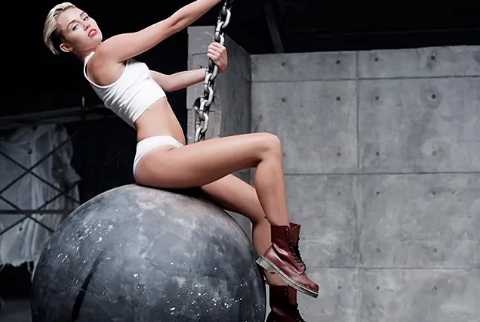
It’s a bright summer morning in 2008 in New Delhi, India, as a mum prepares her daughter for school. The mum switches on the television to keep her kid occupied while she bustles in and out of the kitchen. The Best of Both Worlds from Hannah Montana plays on Disney Channel India. Life is good.
It’s a winter morning in 2013 in New Delhi, India, in the same house. The mum and her tricks to keep her (now) two kids busy are the same. Wrecking Ball by Miley Cyrus plays on VH1 India. This time, she stops in her tracks. The channel is changed hastily as My Heart Will Go On by Celine Dion plays. Order is restored, if only for a moment.
Starting her career with Disney’s Hannah Montana in 2006, Miley was first pitched as the ‘cheerful and family-friendly’ girl. Although the show ended in 2011, she started her ‘good girl gone rogue’ era long before – Can’t Be Tamed in 2010 was our first clue she wasn’t playing by Disney’s rules anymore. At the age of 17, Miley took to revealing a new side of her persona, a change met with resistance from both the media and paranoid Indian mums.
Initially viewed as a rebellious teenager attempting to be edgy, her fourth studio album, Bangerz, and her controversial VMA performance in 2013 sparked large-scale media criticism for being ‘too dark and inappropriate.’ Tabloids ran headlines such as ‘Miley’s Breakdown’ and ‘Disney Star Gone Wild,’ turning her personal evolution into a cautionary tale. By 2015, the outrage had lessened, with Miley being dismissed for smoking weed openly and wearing bizarre outfits. In 2019, the media declared she had become ‘tame’ again, with softer country-pop music and distance from controversy – only to unleash backlash for seemingly disowning the Bangerz era (she just can’t win, can she?). Finally, with her single Flowers becoming a global hit in 2023, Miley has come to be recognized as a bold musician, respected for her discography – for now. Who knows when the next media outrage will strike?
And she wasn’t alone. Time and again, we’ve witnessed several female artists – Taylor Swift, Lady Gaga, Billie Eilish – get ripped apart for stepping outside the box and defying societal expectations. Meanwhile, Eminem’s messy era was just ‘boys will be boys,’ and Harry Styles’ experimentation with gender-fluid fashion was lauded for challenging gender norms. But Miley? She’s been dragged through hell and back just for existing.
For girls growing up in strict households, watching Miley felt like a guilty pleasure—like sneaking out past curfew or listening to explicit songs on low volume. They are given a singular perspective on Miley’s music—wild, rebellious, overly sexual, and unstable—something ‘good girls’ should avoid. What often goes unnoticed is how these perspectives steer young girls and women away from raw self-expression, leading them to self-censor. Such policing of female self-expression is not new. As Margaret Atwood puts it in The Robber Bride:
‘Is everything run by male fantasies? Even pretending you aren’t catering to male fantasies is a male fantasy: pretending you’re unseen, pretending you have a life of your own, unconscious of the ever-present watcher peering through the keyhole in your own head, if nowhere else. You are a woman with a man inside watching a woman. You are your own voyeur.’
This unsettling quote shows how deeply we have internalised what has been told to us. Miley is one of the few who seems to have broken free of male fantasies, in writing about how she views the world and what she desires from it. Her self-expression might be termed provocative and sexual by some, but it is hers. Flawed, rebellious, or melancholy – her artistry is truly hers. If Miley’s journey proves anything, it’s that women who embrace their freedom will always be criticized—but also, that they will endure.
It’s a bright winter morning in 2025, Brisbane, Australia. As I head to the florist, music blasting through my headphones, I buy myself flowers—because if Miley taught us one thing, it’s that we don’t need permission to exist on our own terms.
Written by Jeanie Kumar
Views: 0
